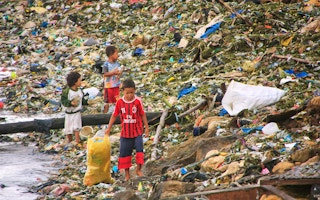Indonesia earlier this year condemned the practice of wealthy countries sending it their waste, but is now doing the same by shipping that same waste to other countries instead of sending it back to the source, environmental groups say.
Between July and August 2019, Indonesia denied entry for 58 containers exported from the U.S. because they were found to contain paper scrap mixed with other waste, such as rubber and used diapers. Indonesian authorities said they repatriated the containers full of waste to the country of origin.
But only 12 of those containers eventually returned to the U.S., according to U.S.-based waste trade watchdog Basel Action Network (BAN) and Indonesian environmental group Nexus3 Foundation. The rest appeared to have been sent to India, Thailand, Vietnam, Mexico, the Netherlands, Canada and South Korea between August and October, the groups reported on Oct. 28.
Using shipment tracking techniques, the group laid out in a report the exact dates and times of the respective consignments landing in those countries, including transit stops.
“Containers do not just travel around the globe by themselves. Somebody directed them,” Yuyun Ismawati, a senior adviser to Nexus3, told Mongabay in a text message.
Yuyun said the final destination of each shipment was determined before it left port, unless there was a strong reason for a diversion along the trip, such as a disaster or tsunami.
“If the stated target destination of a shipment and the reality are different, then this is fraud,” she said.
The containers, which had been destined from the U.S. to Indonesian paper recycling mills PT Mega Surya Eratama (MSE) and PT Surabaya Mekabox (SM), left Indonesia on board vessels operated by shipping companies Cosco, Maersk, and Hyundai Merchant Marine. Thirty-eight containers shipped by Cosco and Maersk ended up in India, while the others carried by Hyundai went to the other countries.
“
Containers do not just travel around the globe by themselves. Somebody directed them.
Yuyun Ismawati, senior adviser, Nexus3 Foundation
The Indonesian government has rebuffed the allegation that it passed the waste on to other countries instead of sending it back to the source countries. It says the re-export documents from PT MSE and PT SM list the U.S. and Germany, respectively, as the final destinations.
“The Indonesian government has never recommended or issued an agreement for re-export of contaminated waste from the United States to other Asian countries,” Syarif Hidayat, the director of international customs at the finance ministry, said in a statement.
Syarif said the government would investigate the allegations, notify the countries of origin and transit of the imported waste, and likely ban imports from the companies that had exported the waste to Indonesia in the first place.
“The Indonesian government highly appreciates anyone who has provided insightful information or feedback, and will follow up on all information by coordinating with other institutions,” he added.
BAN and Nexus3 have called on Indonesia to work with the source countries of the waste in any follow-up action, and to prosecute those involved in the trafficking of the waste.
“Without properly involving the country of origin, or taking the steps to prosecute Basel Convention violators, the criminality will just continue, and more containers will keep coming to pollute Indonesia,” Jim Puckett, the director of BAN, said in a statement.
Puckett also called out lack of enforcement by the receiving countries, particularly India, which has banned the import of plastic waste since August this year.
Last month, Indonesia accused two Singaporeans of illegally importing 87 containers of plastic scrap containing hazardous items from Hong Kong, Spain, Canada, Australia and Japan between May and June this year. Illegally importing hazardous and toxic material into Indonesia is punishable with up to 15 years’ imprisonment and 15 billion rupiah ($1 million) in fines.
Waste imports into Indonesia and other Southeast Asian countries surged after China enforced a ban on the import of all waste at the start of 2018. Indonesia’s imports of plastic waste more than doubled that year to 283,000 tonnes following the ban, according to the national statistics agency.
A Greenpeace report published in April found most of Indonesia’s waste imports came from Australia, Germany, the Netherlands, the United Kingdom, and the United States. The surge in illegal imports has prompted the government to tighten its own rules on the issue.
However, restrictions on importing plastic scrap have been resisted by some, chiefly lobby groups for the plastic recycling industry, which say that tighter inspections have impacted their business and resulting in a decrease in Indonesian exports of recycled plastic products. They also say the sorting and processing of imported waste supports thousands of jobs in the country.
Indonesia already struggles to manage its own waste, which often goes into landfills or is dumped into waterways, from where it winds up in the oceans. The country is the second-biggest contributor to the plastic trash crisis in the oceans, after China, according to a 2015 study in the journal Science.
“We urge President Joko Widodo to conduct a complete investigation of the waste import business, including all ministries and corporations if involved,” said Nur Hidayati, the executive director of the Indonesian Forum for the Environment (Walhi).
“We are calling on the president to revoke the permits of polluters and enact a total ban on waste imports.”
This story was published with permission from Mongabay.com.










